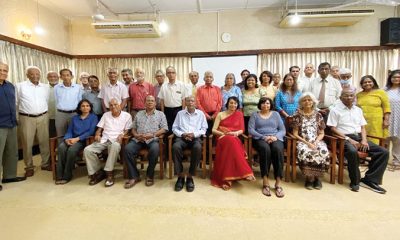Latest News
Education in a country cannot thrive without discipline – President

President Ranil Wickremesinghe stressed the importance of those entering the teaching profession dedicating themselves to the future generation, noting that education in a country cannot thrive without discipline.
He declared that no one would be permitted to disrupt school education between 7:30 am and 1:30 pm and he has directed the Attorney General to consider further measures to ensure this.
The President made these remarks while attending a ceremony at Temple Trees today (03), where appointments were awarded to officers of the Education Administrative Service, as well as teaching appointments to graduates and diploma holders.
Appointments were granted to 60 individuals approved by the Education Service Committee of the Public Service Commission, and teaching positions were awarded to 1,706 graduates and 453 English diploma holders.
The president further elaborated,
Congratulations to all of you entering the administrative and teaching services. Today, you are assuming a very important responsibility.
Even when the country faced bankruptcy in the past two years, funding for education was increased.
Teachers were recruited not only for existing vacancies but also for future needs. It must be said that even in difficult times, these steps were taken with a focus on the country’s future.
Our future is our children. That is why the government is committed to equipping the next generation with new knowledge and modern technology in a changing world. This is a responsibility we all share.
Therefore, everyone entering this honourable profession should dedicate their service to the future generation and must be disciplined. Education in a country cannot be maintained without discipline. You may have 40-50 students in your classroom, but there is a difference between a teacher and a military officer. Military officers train adults, whereas you will be guiding a group of individuals under 18 years of age who need proper training and attention. If we do not protect the country’s education system and allow it to be disrupted, we will lose our future generation.
To build the country’s economy, we must move forward rapidly. In the next 20-25 years, we should aim to raise our Gross Domestic Product (GDP) from USD 85 billion to at least USD 350 billion for our future generations.
It is, therefore, the responsibility of all of us to focus on and prioritize the children’s future. The teaching profession is distinct from other services; it carries a unique dignity that must be upheld.
Today’s schools must uphold discipline. Strikes in schools are detrimental and unjustified. In 2022, under President Gotabaya Rajapaksa’s administration, the only salary increase was for teachers. This year, we provided a stipend of Rs. 10,000 for all government employees. Given the country’s economic situation, further increases were not feasible. Some trade unions have requested a revision and additional salary increases, which is surprising considering teachers have already received two salary increments.
Recently, teachers went on strike, abandoning classrooms to protest at the Colombo Fort railway station. University students and others joined, demonstrating and attempting to reach the Presidential Secretariat, even amidst tear gas. While protests are not new, such actions do not befit the honourable teaching profession.
In the past, teachers on strike would still teach without signing attendance books, or they might wear a black armband while continuing their duties, as seen in some countries. However, the most recent strike was entirely different.
This situation did not occur in Tamil and Muslim schools, where educational activities for children continued. Similarly, international schools and private schools maintained their educational activities effectively.
However, Sinhala-medium schools had to face disruptions. Children from rural areas attend these schools. I question whether this is also a responsibility of the teaching profession. Teachers of Tamil and Muslim schools recognized the importance of education. When Sinhala-medium schools in places like Nuwara Eliya were disrupted, education continued in Tamil-medium schools. Such disparities should not exist in our country.
In certain schools, teachers faced threats preventing them from attending. People fault the government for its lack of action and accuse the opposition of backing such incidents. This situation is troubling.
No one, whether directly or indirectly, should disrupt school education from 7:30 am to 1:30 pm. I have requested the Attorney General to propose measures regarding this issue. It is imperative that the education of children is not hindered by school closures or strikes. Our actions must be taken with future generations in mind.
Yesterday, I discussed with the minister the possibility of implementing a computerized teacher transfer system. Fairness must prevail in promotions and in the treatment of teachers. Moving forward, we will take stronger measures on this front, even if it may provoke dissent. This is the reality we must confront to secure a better future for our children.
Therefore, I urge everyone to prioritize the future of our children. I particularly appeal to the opposition not to endorse actions that sabotage education. We must heed the voices of the people and parents in our decisions. Once again, I extend my best wishes to all entering the teaching profession today.”


Latest News
China’s Xi hails ‘new golden era’ with Malaysia during trade tour

Chinese President Xi Jinping has met Malaysia’s King Sultan Ibrahim in Kuala Lumpur as part of a regional push to shore up Beijing’s trade relationships.
The diplomatic stop on Wednesday marks the second leg of Xi’s three-nation tour, which also includes Vietnam and Cambodia, and comes amid sharp tariffs imposed by the United States that are reshaping the global economic landscape.
Sultan Ibrahim welcomed Xi in a colourful ceremony at the golden-domed Istana Negara palace before his meeting with Malaysian Prime Minister Anwar Ibrahim at the administrative capital of Putrajaya.
Xi touted a “new golden era” of Chinese-Malaysian relations, following the 50th anniversary of diplomatic ties last year. The king announced new cooperation between the countries in various fields, including artificial intelligence.

“This is a hugely significant visit,” said Al Jazeera’s Rob McBride, reporting from Putrajaya. “It takes place during this unprecedented trade war that is developing with the United States, with both Malaysia and China finding themselves in the middle.”
Khoo Ying Hooi, an associate professor in the department of international and strategic studies at Malaya University, said the visit offered a chance to “test the waters for regional solidarity” amid the US trade disruptions.
“It’s not just about friendship, it’s about realigning the regional centre of gravity towards Beijing,” she said.
Malaysia is the current chair of the Association of Southeast Asian Nations (ASEAN) bloc, whose members are among the hardest hit by new US tariffs.
ASEAN member Vietnam, a manufacturing powerhouse, was slapped with 46 percent tariffs, and Cambodia, a significant producer of low-cost clothing for big Western brands, was hit with a 49 percent duty.
Malaysia, Southeast Asia’s third-largest economy, was hit with a lower tariff of 24 percent. Though the measures have been paused for 90 days, President Donald Trump has warned that no country is “off the hook”.
[Aljazeera]
Latest News
Severe traffic reported on Ella-Wellawaya road due to inclement weather

Police urge motorists who intend to use the Ella – Wellawaya Road to use alternative roads as there is a severe vehicle congestion due to inclement weather condition.
Latest News
UK Supreme Court backs ‘biological’ definition of woman

The UK Supreme Court has unanimously backed the biological definition of “woman” under the 2010 Equality Act.
It marks the culmination of a long-running legal battle which could have major implications for how sex-based rights apply across Scotland, England and Wales.
Judges sided with campaign group For Women Scotland, which brought a case against the Scottish government arguing that sex-based protections should only apply to people that are born female.
Judge Lord Hodge said the ruling should not be seen as a triumph of one side over the other, and stressed that the law still gives protection against discrimination to transgender people.
The Scottish government argued in court that transgender people with a gender recognition certificate (GRC) are entitled to the same sex-based protections as biological women.
The Supreme Court was asked to decide on the proper interpretation of the 2010 Equality Act, which applies across Britain.
Lord Hodge said the central question was how the words “woman” and “sex” are defined in the legislation.
He told the court: “The unanimous decision of this court is that the terms woman and sex in the Equality Act 2010 refer to a biological woman and biological sex.
“But we counsel against reading this judgement as a triumph of one or more groups in our society at the expense of another, it is not.”
He added that the legislation gives transgender people “protection, not only against discrimination through the protected characteristic of gender reassignment, but also against direct discrimination, indirect discrimination and harassment in substance in their acquired gender”.
Campaigners who brought the case against the Scottish government hugged each other and punched the air as they left the courtroom, with several of them in tears.
The Equality Act provides protection against discrimination on the basis of various characteristics, including “sex” and “gender reassignment”.
Judges at the Supreme Court in London were asked to rule on what that law means by “sex” – whether it means biological sex, or legal, “certificated” sex as defined by the 2004 Gender Recognition Act.
The Scottish government argued the 2004 legislation was clear that obtaining a GRC amounts to a change of sex “for all purposes”.
For Women Scotland argued for a “common sense” interpretation of the words man and woman, telling the court that sex is an “immutable biological state”.

Outside the Supreme Court, For Women Scotland co-founder Susan Smith said: “Today the judges have said what we always believed to be the case, that women are protected by their biological sex.
“Sex is real and women can now feel safe that services and spaces designated for women are for women and we are enormously grateful to the Supreme Court for this ruling.”
A UK government spokesman said: “This ruling brings clarity and confidence, for women and service providers such as hospitals, refuges, and sports clubs.
“Single-sex spaces are protected in law and will always be protected by this government.”
Conservative leader Kemi Badenoch described the ruling as a “victory for all of the women who faced personal abuse or lost their jobs for stating the obvious”.
But Scottish Green MSP Maggie Chapman, a prominent campaigner for trans-rights, said: “This is a deeply concerning ruling for human rights and a huge blow to some of the most marginalised people in our society.
“It could remove important protections and will leave many trans people and their loved ones deeply anxious and worried about how their lives will be affected and about what will come next.”
The Scottish government has not yet commented on the ruling.
[BBC]
-

 News5 days ago
News5 days agoSuspect injured in police shooting hospitalised
-

 Features6 days ago
Features6 days agoRobbers and Wreckers
-

 Business6 days ago
Business6 days agoBhathiya Bulumulla – The Man I Knew
-

 Business5 days ago
Business5 days agoSanjiv Hulugalle appointed CEO and General Manager of Cinnamon Life at City of Dreams Sri Lanka
-

 Business7 days ago
Business7 days agoNational Anti-Corruption Action Plan launched with focus on economic recovery
-

 Features4 days ago
Features4 days agoLiberation Day tariffs chaos could cause permanent damage to US economy, amid global tensions
-

 Business4 days ago
Business4 days agoMembers’ Night of the Sri Lanka – Russia Business Council of The Ceylon Chamber of Commerce
-

 Features4 days ago
Features4 days agoMinds and Memories picturing 65 years of Sri Lankan Politics and Society










